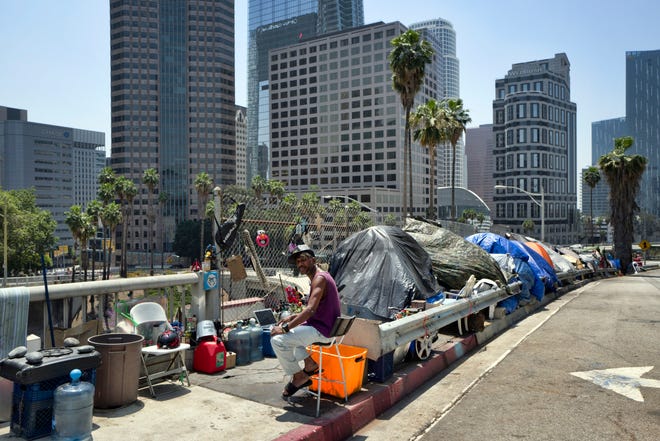This Humanitarian Dilemma
"I do think this is, in a lot of ways, a test of who are we as a community."
"Some people who I'd put in the fed-up category, they're not bad people. They would describe themselves as left of centre, and sometimes very left of centre, but at some point they reach the breaking point."
"I think those of us in the service-provider community always knew we weren't going to solve the problem. But I think the expectation was we were going to make a significant dent."
"So on the one hand, the message is we have all these resources to quote-unquote solve this problem. And what the general public sees is, it's not getting solved, it's not getting better, it's getting worse."
John Maceri, chief executive, People Concern social services agency, Los Angeles
"I think they care more about animals than us."
"They're making parks for dogs, but they're not building housing for us."
Lucrecia Macias, nurse, cancer patient, homeless
"They'll kick you out of stores."
"They won't even let you into laundromats to wash your clothes. The bus driver won't pull over."
Lynell Cain, resident of tent encampment, Los Angeles
"Putting mentally ill people and people with drug abuse problems in residential areas is careless."
"This is definitely a more complicated definition than just homelessness. Even during the daytime, I fear walking alone."
Paneez Kosarian, technology company employee, San Francisco
 |
| California has about 140,000 homeless residents -- a quarter of the nation's homeless population. Richard Vogel, AP |
Little wonder she does. In September she was attacked by a man outside the front door to her apartment building. A homeless man who warned her the world had been taken over by robots. And then he attacked her. A closed-circuit security camera's footage showed her desperately wrestling with the man. That footage made local news coverage, linking the episode with other attacks carried out by homeless people who appeared to be on the spectrum of mental illness. Peoples' sense of security and personal safety linked to where they live is being eroded.
Lucrecia Macias, the nurse who now lives as a homeless person in Los Angeles had her own house in Palmdale. And then dark fate stepped in when she was diagnosed with cancer and she soon saw herself in deep financial straits when she lost her home. She sees sympathy being evinced for the well-being of peoples' companion pets, but none extended to those like herself living rough as a result of her middle-class life having been disrupted, effectively ruined, lost to the cost of her medical care, leaving her to wander disconsolate on the streets, feeling abandoned by society.
There was a proposed municipal plan for a homeless shelter in a waterfront district of new office buildings and condominiums. Ms.Kosarian who had that frightening encounter with a homeless man and other residents referred to city estimates reflecting half of the homeless people in San Francisco having issues with substance abuse when they opposed the plan. An issue they feel is being overlooked when the finger is pointed at a lack of housing causing homelessness. The city's mayor stated that San Francisco was prepared to enforce a state law to force mentally ill people off the streets. Where to?
 |
| Homeless encampment in Los Angeles, Sept. 23, 2019. (Mario Tama/Getty Images) |
Open-air drug dealing in some areas of Los Angeles and San Francisco is rampant. In those same areas human feces litter the streets along with discarded needles and syringes. California cities have always had a homelessness problem, but in recent years, it has become epidemic. In Los Angeles, the city counted up to 59,000 homeless people, a huge increase over the past few years. According to a poll by the Public Policy Institute of California released a month ago, for the first time in two decades Californians cite homelessness as a major concern.
Bill Bedrossian, chief executive of Covenant House California, a shelter non-profit group with programs for homeless youth, cites frustrations evinced by the public as illustrating an "increase in the lack of empathy. People don't want homeless people near them." When Covenant House wanted to open a centre to house and offer counselling services for up to 30 young people, the community resisted. "It's the worst it's ever been, as far as the backlash", he commented.
| Homeless encampment, Oakland, California. John G.Magabanglo, EPA-EFE |
In San Francisco, residents installed boulders on sidewalks as deterrents to people erecting tents and sleeping there. Homeowners in Los Angeles installed prickly plants nearby sidewalks for the same purpose. There are grassy areas that have been fenced off with green plastic in hopes of restraining homeless people from putting up tents and building encampments. In San Fernando Valley, L.A., the experience of homeless people living in Chatsworth was to suffer rocks thrown from cars, insults shouted at them, and pepper-spray targeting them.
"When people think about the homeless crisis, sometimes humanity goes out the window. People say, 'I don't like what's going on. I don't want them near our school, get rid of them'."It is not easy, shouldering the burden of being your brother's keeper, not anywhere, not even in one of the wealthiest states in the wealthiest nation on Earth. The problem is endemic and it is everywhere, from nations struggling to join the cadre of developing nations to those countries where economic development has gone hand-in-hand with increased trade, business development and advances in technology, none of which has solved the problem of homelessness.
"When people complain, they are not combining the complaint with a compassionate solution."
Candice Elder, founder, executive director, East Oakland Collective
| San Francisco police officers wait as homeless people collect their belongings. Ben Margot, AP |
Labels: California, Homelessness, United States

0 Comments:
Post a Comment
<< Home